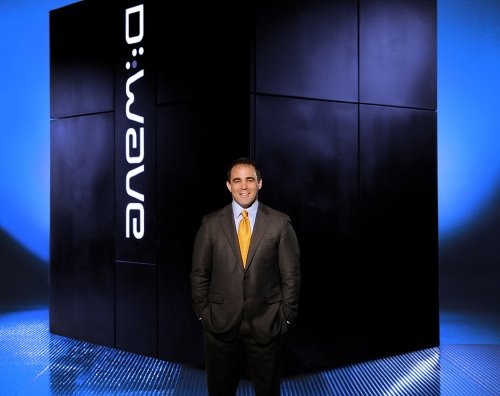
D-Wave’s Geordie Rose with one of the firm’s quantum computers. (Courtesy: D-Wave)
By Hamish Johnston
Canada’s D-Wave Systems is installing one of its quantum computers at NASA’s Ames Research Center in California. The new 512-qubit system – dubbed D-Wave Two – will be used by NASA, Google and the Universities Space Research Association (USRA) to investigate how quantum computers could be used to solve a range of different problems. According to Vancouver-based D-Wave, the computer will be available for use in the third quarter of this year.
In a statement released today, D-Wave said that the facility will be used “to develop applications for a broad range of complex problems such as machine learning, web search, speech recognition, planning and scheduling, search for exoplanets, and support operations in mission control centres”. The system will be accessible to US-based researchers via the USRA.
D-Wave says that Google, NASA and USRA subjected the 512-qubit system to a series of benchmark and acceptance tests before installation. “In all cases, the D-Wave Two system met or exceeded the required performance specifications, in some cases by a large margin,” claimed the firm.
I visited D-Wave last year and spoke to the company’s co-founder Geordie Rose. You can hear some of that conversation and much more about quantum computing in this podcast: Quantum computing: Challenges, triumphs and applications.
Best wishes for the future of quantum computing.
I would like to know if NASA and Google will share their gain knowledges with D-Wave and if D-Wave stay as leader in quantum computing for decade or longer? If they sell more computers and gain knowledges about them then they can more quickly improve them and quantum computers become widespread. Also it must be interesting what other supporting facilities quantum computers have? And we need to have comparation of these computers ( for the same tasks on all these computers if we receive the same results )?
Is it possible to use supercomputers to calculate furher the results made by quantum computers and vice versa? And is it possible to make control for calculations of supercomputers and quantum computers ( if the results of calculated tasks are the same )?
Supporting facility for quantum computer can be supercomputer that can take results calculated by quantum computer and work with it by usual way. We can see the results on monitor, change it there, visualate more different results from quantum computing at once time…
<<reader01 you just coined a cool new word w/ visualate i like it. but isn't it scary to think of an actual skynet?
2030's not 2040's it might happen.